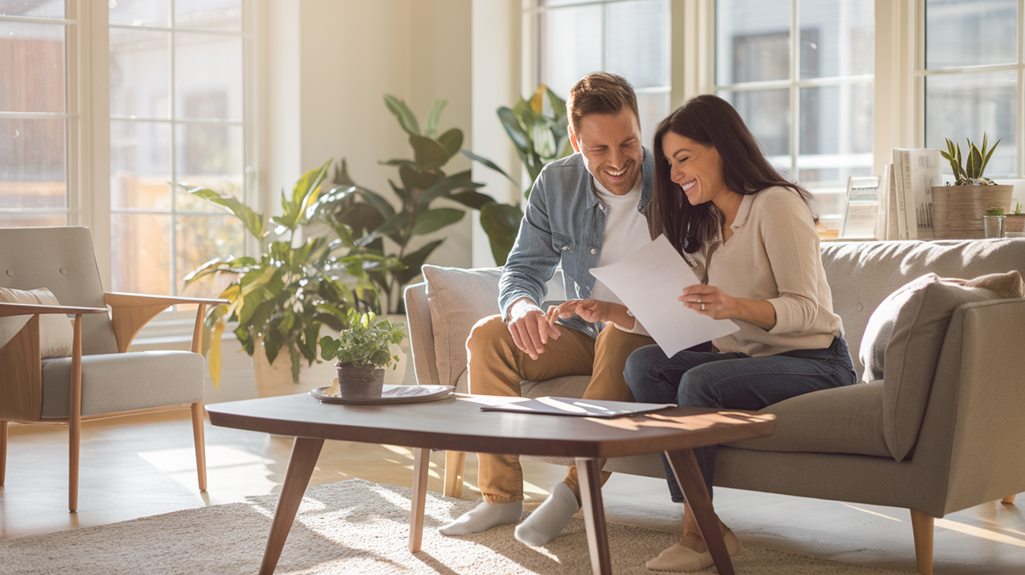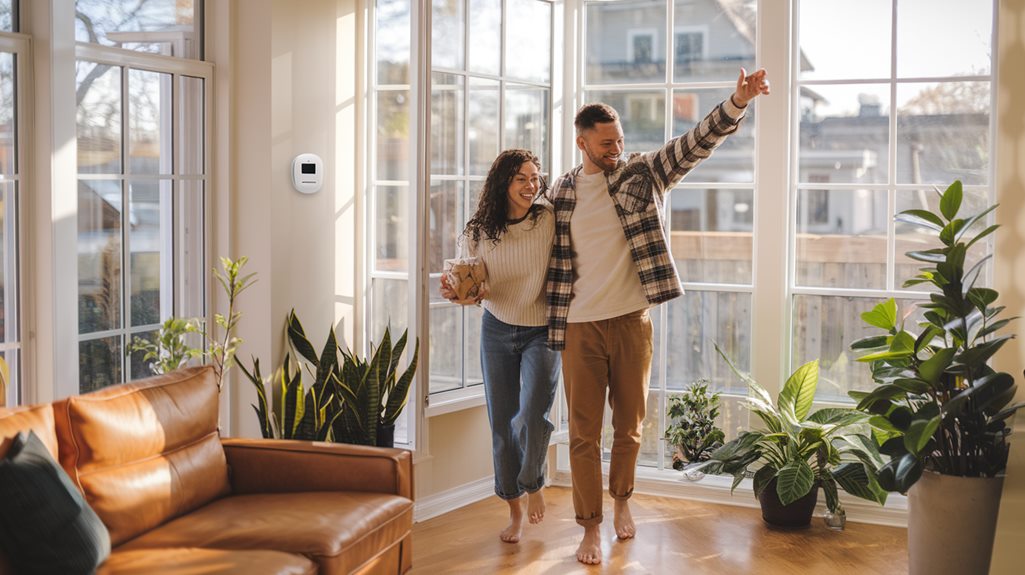If you're a first-time homeowner, it's important to know your budget and find the right mortgage. This helps you build a strong money plan.
Don't forget to think about extra costs like repairs. It's smart to get a home inspection so you can find any hidden problems.
You also need insurance to protect your home from risks. Take your time to compare different insurance options.
Making your home more energy-efficient and secure can save you money in the long run and make you feel safer.
Make your new space feel like home by adding your personal touch.
And remember to save some money for emergencies.
These tips will help you take care of your new home. Keep learning to be even better at being a homeowner!
Ready to start building equity in your own Michigan home? Get your personalized home loan quote today.
Understand Your Budget

Understanding your budget is really important if you want to buy a home. Start by using simple ways to manage your money that fit your goals.
Keep track of what you spend so you can see where to save. This helps you know how you spend your money and prepares you for mortgage payments later.
When you write down your expenses, you can see how healthy your finances are. This makes you feel ready and strong as a future homeowner.
You can use easy apps to help you keep track of your money, so you always know where it goes.
Focus on the things you need and change your spending if you have to. This way, your budget can help you reach your dreams and feel at home in your new neighborhood.
Michigan residents, unlock the door to your new home. Request your home loan quote from Treeside Financial today.
Secure the Right Mortgage
Getting the right mortgage is an important step when buying a home. There are different types of loans, like fixed-rate and adjustable-rate mortgages. Knowing these can help you make good choices.
First, check your credit score. This score affects how much interest you pay and if you can get a loan. It's also great to work with a good mortgage broker. They can help you get pre-approved and figure out how much money you need for a down payment and closing costs.
You might be closer to buying your home than you think
Take our 2-minute home buyer readiness quiz to see how prepared you really are – no credit check required.

If your money situation might change, look into refinancing options. Fixed-rate loans are steady and reliable. Adjustable-rate loans can be good if you think you'll earn more money in the future.
Choosing the right mortgage helps you feel part of a community of smart homeowners. With some research and help from experts, you can find a mortgage that fits your money goals and dreams.
Plan for Additional Costs

Buying a home is very exciting! But remember, there are more costs than just the price of the house.
Once you own your home, you might want to make it nicer. This means spending money on things like painting or fixing up rooms. Sometimes, things can break, and you need to have some money saved for those surprises.
You'll also need to pay for water and electricity every month. Don't forget about property taxes! These can change a lot and can affect how much money you have left.
Taking care of the outside of your home is important too. If you want your yard to look nice, you'll need to spend some money on plants and flowers.
As time goes by, you might want to buy new appliances, like a fridge or a stove, to make your home better. If you live in a neighborhood with a Homeowners Association (HOA), remember to include their fees in your monthly budget.
Lastly, every season, it's a good idea to check and fix things in your home. This will help keep it in good shape and protect your investment.
Prioritize Home Inspections
Getting a home inspection is very important for first-time homeowners. When you start this big adventure, having a home inspection checklist can help you find problems before they cost you a lot of money.
It's good to know that some issues, like bad wiring, leaky pipes, or cracks in the walls, may not be easy to see. By checking for these things early, you can keep your home safe and avoid surprise costs later.
Hiring a good inspector can make you feel better and help you be sure about your new neighborhood.
Get Insurance Coverage

When you pick insurance for your new home, it's important to know what each policy covers.
Look at different options to make sure you get good protection for a fair price.
This way, you can feel safe about your home and be ready for any surprises that might happen.
Understand Policy Details
Getting homeowners insurance is really important to keep your home safe. It's like a shield for your house! You need to look closely at your insurance policy to know how it works.
There are different types of policies. Some help if your house gets hurt, while others help if someone gets hurt on your property. If you're a new homeowner, make sure to check out all your options.
Think about what could happen where you live. For example, if you live near a river, you might need extra insurance for floods.
It's also important to set the right amount of coverage. You don't want to find out you don't have enough help if something goes wrong.
When you understand your insurance policy well, you can feel safe and happy in your new home, knowing it's protected.
Compare Coverage Options
Getting insurance can feel a bit scary, but it's very important for new homeowners to compare their coverage options.
First, learn about the different types of policies. Make sure the coverage limits are enough for what you need. Check how much you'll pay each month, and see if it fits in your budget. Don't forget to think about liability protection for accidents that might happen.
Here's a simple guide to help you:
- Know Your Risks: Think about what could happen to your home to choose the right coverage.
- Make a Home Inventory: Write down everything in your home. This will help if you need to make a claim.
- Look for Extra Options: Find additional coverage to keep your home even safer.
- Compare Companies: Check different insurance companies to find the best price and service.
Following these steps will help you feel safe and protected.
Start a Maintenance Schedule
Keeping your home in good shape is really important. It helps keep your house valuable and makes it last longer. By doing some tasks each season, you can make sure everything is working well and looking nice. Plus, it helps you feel good in your neighborhood!
Here's a simple guide to help you:
| Season | Key Tasks | What to Focus On |
|---|---|---|
| Spring | Clean the gutters, check the roof | Take care of the lawn, clean the outside |
| Summer | Check the air conditioner, look at the siding | Stop pests, fix the deck |
| Fall | Service the heater, seal the windows | Rake leaves, check the chimney |
| Winter | Check insulation, test alarms | Clear snow, get ready for emergencies |
Following this plan can help you avoid big problems later and keep your home looking great!
Improve Energy Efficiency

Making your home more energy efficient is a great choice for new homeowners. It helps you save money on bills and is good for the planet too. Here are some easy ways to get started:
- Energy Audits: Get a professional to check your home for energy waste. This will help you know where to make improvements.
- Insulation and Temperature Control: Good insulation and smart systems can help keep your home cozy all year. This means less energy is wasted.
- Energy Saving Appliances and Smart Technology: Buy appliances that use less energy. You can also use smart technology to help manage your energy use better.
- Renewable Energy and Eco-Friendly Landscaping: Think about using solar panels or planting trees and plants that help the environment. This way, you can use clean energy and make your home greener.
Enhance Home Security
Keeping your home safe is really important. It helps protect your things and makes you feel good inside. A great way to start is by putting in smart locks. They're easy to use and help keep your home safe.
You can also add lights outside your house. These lights make it bright and help you see if someone is around. Security cameras can be good too. They watch your home and can scare away bad people.
Joining a neighborhood watch is a nice idea, too. It helps everyone look out for each other.
Don't forget to have a good alarm system and check it often to make sure it works.
Also, keep your computer safe. Use strong passwords so no one can steal your personal information.
Lastly, think about fire safety. Install smoke detectors and have fire extinguishers ready.
When you do all these things, you make your home a safe place for your family and friends.
Personalize Your Space

Making your space feel like home is really important.
First, think about colors you love. Pick colors that show who you're and look nice with your house.
Then, add special things like your favorite pictures or family treasures. This will help make your space feel just right for you and still look good with what's in style.
Choose Color Schemes
Moving into your first home is so exciting! One fun part is picking colors that show who you are. The colors you choose can change how a room feels.
Here are some color ideas to help you:
- Neutral Tones: These colors are calm and can fit in any room.
- Earthy Hues: These colors make your home feel warm and cozy.
- Bold Accents: Bright colors add energy. They're great for places where you have friends over.
- Pastel Shades: Soft colors make you feel relaxed. They're perfect for bedrooms.
These ideas can help you make your home a place where you feel happy and comfortable!
Incorporate Personal Decor
Making your new home feel like yours is very important. You can start by showing off your creativity with fun DIY projects that show who you are.
Use special things like family pictures or old treasures to make your home feel warm and connected to your past.
Choose decorations that are useful and help you save space. Each item should be something you love and need.
Think about creating different rooms with themes based on what you like, like a cozy reading corner or a bright art area.
Colors can also change how a room feels. Pick colors that make you happy or calm.
And remember to change your decorations with the seasons to keep things looking fresh and cheerful.
Build an Emergency Fund
Building an emergency fund is super important for first-time homeowners. It acts like a safety net when unexpected costs pop up, helping you stay financially safe.
Here are some easy ways to save:
- Set a Goal: Think about how much money you might need for surprises. A good rule is to save enough for three to six months of your living costs.
- Save Automatically: You can set up your bank to move money into your emergency fund every month. This way, you save without even thinking about it!
- Pick Good Accounts: Look for savings accounts that give you more interest. This helps your money grow faster over time.
- Check Your Fund Often: Every few months, take a look at your emergency fund. If your living costs or income change, you might need to save a bit more.
Having an emergency fund makes you feel safe and happy in your new home. It helps you face challenges with confidence!








